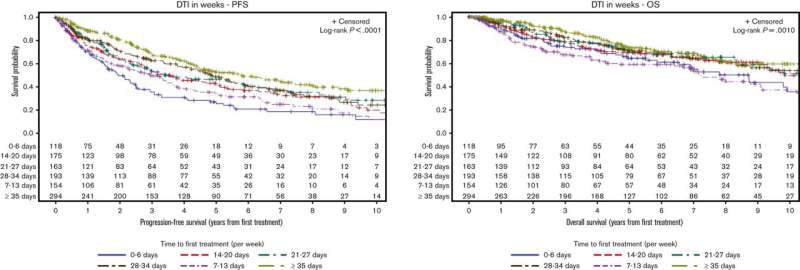This article has been reviewed according to Science X's editorial process and policies. Editors have highlighted the following attributes while ensuring the content's credibility:
fact-checked
peer-reviewed publication
trusted source
proofread
New data informs treatment of blood cancer during pregnancy

Today, Blood Advances published a study revealing that patients with relapsed/refractory (r/r) lymphoma during pregnancy experienced a progression-free survival rate of 24% and an overall survival rate of 83%. Receiving a lymphoma diagnosis during pregnancy is uncommon but occurs for roughly one in 4,000 women. On rare occasions, women who achieved remission from a previous lymphoma diagnosis find out their cancer has returned during pregnancy, yet scarce data exist to guide clinicians on how to treat this.
"To our knowledge, no previous data has been published for patients with r/r lymphoma presenting during pregnancy," explained Andrew Evens, DO, MBA, MSc, associate director for clinical services at Rutgers Cancer Institute of New Jersey and system director of medical oncology and oncology lead at RWJBarnabas. "Yet the treatment options and prognosis are often very different for lymphoma that is newly diagnosed, versus when the cancer returns."
For the first time, researchers sought to analyze the outcomes of pregnant women with r/r lymphoma based on the timing of the pregnancy and type of lymphoma. Performing a retrospective analysis, they identified 23 patients with r/r lymphoma who were diagnosed at a median of 20 weeks gestation, or approximately the second trimester. Roughly 80% of patients included in this study had Hodgkin lymphoma and most patients elected to delay chemotherapy until after giving birth.
Five individuals chose to begin treatment during pregnancy, which Dr. Evens explained was due to personal preference and the potentially life-threatening nature of their cancer diagnoses. This included one patient who received checkpoint inhibitor therapy during the majority of the second and third trimesters of pregnancy. Scientists also collected data on patient demographics, disease characteristics, and obstetric and neonatal outcomes.
Results revealed overwhelmingly positive overall survival rates at 83%. Progression-free survival, however, was lower, at 24%. 19 women in the study delivered live births. Most were induced and over half were preterm. Four patients terminated their pregnancies or experienced spontaneous abortions. Researchers performed a full follow-up on 15 patients and found that 10 had relapsed and two passed away.

Initiating chemotherapy treatment during pregnancy can put the fetus at risk of harm, but delaying treatment may allow the cancer to progress and harm the patient and the unborn child. According to Dr. Evens, women elect to delay treatment until postpartum for a variety of reasons, such as their age, status of lymphoma, and the needed treatment regimen.
"These decisions are incredibly individualized and consider patient age, comorbidities, tumor volume, and the status of the lymphoma," explained Dr. Evens. "Often the patient chooses to carry the pregnancy to term and treat the cancer afterward. Conversely, there are cases where a patient is highly symptomatic, as well as cases that are life-threatening both to the patient and the fetus. Under those circumstances, we strongly consider treating the cancer during pregnancy if beyond the first trimester."
Dr. Evens advised that while it is not known precisely why the progression-free survival for patients in this study is so low, a plausible explanation is that most patients postponed cancer treatment until after their pregnancy and may not have begun treatment until after these markers were collected. He also explained that, when possible, fetal outcomes are best when the pregnancy is carried to term, and he emphasized the importance of close collaboration across multiple medical disciplines, especially maternal fetal medicine.
"While every case is unique, for patients wishing to proceed with pregnancy, we generally recommend taking the gestation to term delivery at 37 weeks or beyond," said Dr. Evens. "There are previously published data from cancer patients showing that preterm delivery can significantly adversely affect the child's cognitive scores later in life."
While the study sample size was relatively small, Dr. Evens reiterated that this disease profile is relatively uncommon during pregnancy and that it is often difficult to recruit pregnant women into clinical trials.
"The goal of this study is to provide data that can inform patients and providers. While an r/r lymphoma diagnosis during pregnancy is rare, we hope to ensure that oncologists and women have some form of guidance on how to approach this complex clinical scenario," said Dr. Evens.
More information: Faheem Farooq et al, An International Real-World Analysis of Relapsed/Refractory Lymphoma Occurring During Pregnancy, Blood Advances (2023). DOI: 10.1182/bloodadvances.2023010090 , ashpublications.org/bloodadvan … Analysis-of-Relapsed

















